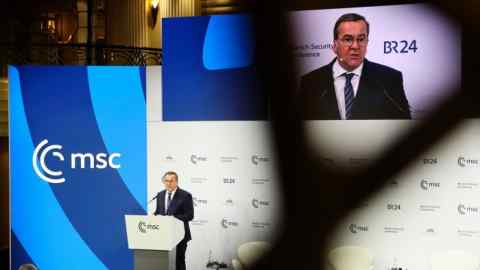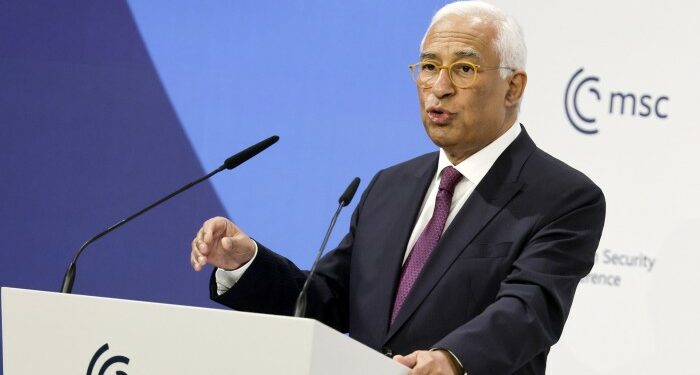Your guide to what the 2024 US election means for Washington and the world
The EU must be involved in negotiations with Russia over the end of the Ukraine war in order to map out Europe’s future security architecture, the European Council president has said.
The call comes as António Costa and other senior European leaders prepare to meet in Paris to discuss their response to US President Donald Trump’s decision to begin talks to end the almost three-year war with Russia’s Vladimir Putin.
The Paris talks come as the US and Russia’s top diplomats prepare for face-to-face talks in Saudi Arabia, and will focus on how to respond to the fast-moving negotiations, and Trump’s demand for Europe to reduce its reliance on US military support.
Trump last week announced bilateral talks with Putin to end the almost three-year war, alarming European capitals that fear a deal could be made without their involvement.
“If Trump really wants that the Europeans assume greater responsibility for their own security, then of course the Europeans need to be the key actor in designing the new security architecture,” Costa told the Financial Times.
“It is not only about Ukraine,” Costa, who represents the bloc’s 27 national leaders, said in an interview at the Munich Security Conference this weekend. “The negotiations on the new security architecture need to take into account that Russia is a global threat, not only a threat to Ukraine.”
Costa’s remarks came as European capitals reeled from a week of unexpected announcements from the Trump administration, including the Saudi Arabia talks between US secretary of state Marco Rubio and Russian foreign minister Sergei Lavrov, and a scathing speech from US vice-president JD Vance that accused European governments of infringing the rule of law and suffering from a “threat from within” that was more dangerous than Russia.
US secretary of state Marco Rubio arrives in Saudi Arabia on Monday © Evelyn Hockstein/AFP/Getty Images
On Saturday, Trump’s Ukraine envoy Keith Kellogg said that European countries would not “have a seat at the table” in the negotiations, but they could have their views taken into account.
That came after the US sent European capitals a request for information on what weapons, money and peacekeeping troops they could provide to post-conflict Ukraine, in what officials said was an opportunity to lobby for a right to influence the talks.
“Negotiations are between belligerents,” said Costa. “Of course, it’s necessary to negotiate between Ukraine and Russia. But this war in Ukraine is not only about Ukraine. It is about European security.”
Recommended

In the lead-up to his February 2022 invasion of Ukraine, Putin had demanded Nato scale back its defence deployments in eastern European states. Nato and its member states have refused to do this.
Costa cited Russia’s aggressive stance towards the Baltic states Estonia, Latvia and Lithuania, which are EU and Nato members, and occupation of territory in states on the EU’s eastern flank as reasons why Brussels needed to be part of the talks.
“Russia is clearly a threat to Baltic sovereignty, to our eastern border,” he said. “They have a military presence in Moldova, in Georgia.”
Mark Rutte, Nato’s secretary-general, said that if Europe wanted a role in the talks, it needed to be clear about what it wanted and what it could offer.
“I was a little bit taken back by the European reaction saying, oh, we need a place at the table,” he told reporters in Munich. “If you want a place at the table, make sure you come up with relevant proposals. Make sure you spend more . . . particularly when it comes to Ukraine.”
Source link : http://www.bing.com/news/apiclick.aspx?ref=FexRss&aid=&tid=67b444485f6944a588dd924e2167f73f&url=https%3A%2F%2Fwww.ft.com%2Fcontent%2F9fb2c865-8183-4b2c-86a0-bd55e86728da%3Fsharetype%3Dgift&c=6567898403441807539&mkt=en-us
Author :
Publish date : 2025-02-17 01:45:00
Copyright for syndicated content belongs to the linked Source.


